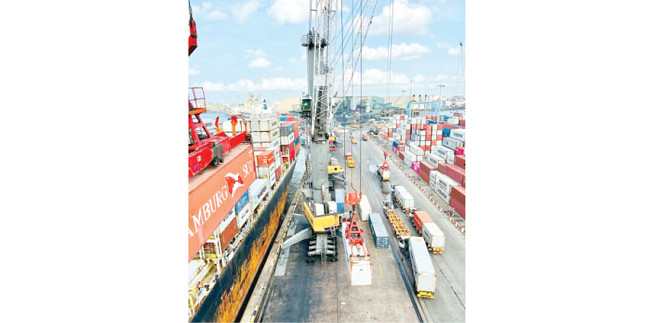The Federal Government recently sent memo’s to Federal Government-Owned Enterprises (FGOE), including the Nigerian Ports Authority (NPA), informing the agencies of the plan to slash their internally generated revenue (IGR) by 50 percent. In this report, TOLA ADENUBI looks at why this might hurt Nigerian ports system.
The Federal Ministry of Finance, in a circular dated December 28, 2023, with reference number, Ref FMFCME/OTHERS/IGR/CFR/21/2023, informed all federal ministries, departments and agencies/parastatals on the automatic deduction of 50 percent from their internally generated revenue.
While other revenue generating agencies of government will easily cope with this policy given the fact that aside payment of workers’ salaries, they hardly do much with the money that they earn, an agency like the Nigerian Ports Authority (NPA) will struggle to cope, given the enormous task that rests on it in the midst of intense competition for cargoes by neighbouring ports in the West African sub-region.
It is no longer news that for years, many cargoes destined for Nigerian ports were diverted to neighbouring ports of Lome, Accra and Abidjan because Nigerian ports lacked the wherewithal to compete with these ports, due to its shallow draft which couldn’t berth very large vessels commonly being used to move cargoes by shipping lines.
The emergence of the $1.5 billion Lekki Port and the constant upgrading of existing ports was a move by the Federal Government to wrest back lost cargoes to Nigerian ports and ultimately make the nation’s ports the hub in the West African sub-region.
With calls in some quarters that the revenue of the NPA be slashed by 50 percent, the following activities, which are geared towards putting Nigerian ports on the global map of port competitiveness, might be affected:
Dredging of port channels
Dredging is the removal of sediments and debris from the bottom of lakes, rivers, harbours and other water bodies. It is a routine necessity in waterways activities around the world because sedimentation – the natural process of sand and silt washing downstream – gradually fills channels and harbours.
Dredging often is focused on maintaining or increasing the depth of navigable channels, anchorages, or berthing areas to ensure the safe passage of boats and ships. Vessels require a certain amount of water in order to float and not touch the bottom. This water depth continues to increase over time as larger and larger ships are deployed. Since massive ships carry the bulk of the goods imported into most countries these days, dredging plays a vital role in any maritime nation’s economy.
Nigerian port channels are probably the shallowest in the West African sub-region, especially the Eastern Ports channels. They require constant dredging, without which vessels cannot be easily piloted to berth. Dredging of ports’ channels requires a huge financial outlay. This will be pretty difficult to achieve when 50 percent of NPA’s internally generated revenue is removed. The resultant effect will lead to ship owners diverting more of their vessels to neighbouring countries where ease of doing business is provided.
Maintenance of quay aprons
The function of the quay apron is to provide for the mooring and unloading/loading of vessels and the transfer of containers to and from the storage yard. Many of the quay aprons in Apapa and Tin-Can Ports, are in bad shape due to old age and they, therefore, constitute grave danger, not only to men but also to equipment.
Maintaining and sustaining healthy quay aprons is capital-intensive and if Nigerian ports’ quay aprons are this bad now when NPA’s revenue has not yet been slashed by 50 percent, one can only imagine what the situation would look like when the agency’s revenue is slashed.
It is not a secret that Nigeria’s neighbouring ports are ready to capitalise on its inability to provide the required infrastructure to attract ship owners. Thus, it is imperative that the Federal Ministry of Finance re-considers its plan to slash the revenue of the NPA.
Port terminal/berth maintenance
Though the 1996 port concession ceded the operations of ports’ terminals to private investors, the maintenance of the port terminals, which include yards and berths, are still under the prerogative of the NPA.
A port terminal is a dedicated space inside a port where certain operations like cargo processing, passenger embarkation and debarkation and vessel maintenance happen. They can be specialised to handle particular types of goods such as bulk, container, or oil terminals.
Berth is an area within a port or terminal where ships moor or anchor. It is a designated area with the necessary infrastructure and facilities for a vessel to dock, load or unload cargo and receive services like maintenance or re-fuelling. Berths might vary in size and capacity, depending on the sort of vessel they handle.
Maintenance of ports terminals and berths is also capital-intensive. Presently, all the infrastructure in Nigerian ports and terminals are in a deplorable state, yearning urgent repairs.
The outrage over the decay of infrastructure at the nation’s ports of Tin-Can, Apapa, Warri and Calabar have been on the front burner for most part of 2022 and 2023, with the NPA clamouring for $800 million to rehabilitate these ports.
With the Minister of Marine and Blue Economy, Gboyega Oyetola, only just recently announcing that the much-needed funds for port rehabilitation is almost ready, the quest to slash the revenue of the NPA might just be calamitous, given that the agency will be needing every kobo that it earns as it strives to enter a phase of port rehabilitation process while also ensuring that the nation’s ports remain competitive.
Manpower development
A healthy and well-trained workforce is a prerequisite for improved productivity and efficient service delivery. Needless to say, port operations are a specialised one that requires a well-trained workforce to compete favourably and take the lead to become the hub of maritime business in the West African sub-region. A 50 percent deduction of NPA-generated revenue might impede the attainment of this lofty dream.
Read Also: BREAKING: Meeting with FG in deadlock, strike continues – SSANU




